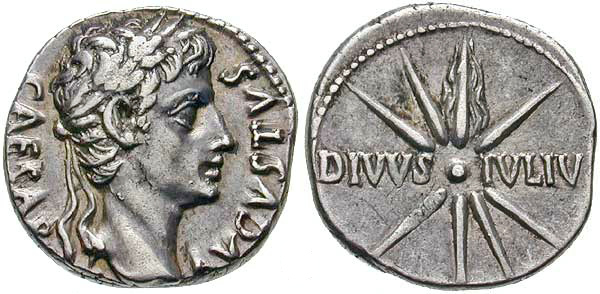Today is tax day.
By now, we’ve probably all heard a homily or two highlighting the words of Jesus, “Render unto Caesar the things that are Caesar’s, and unto God the things that are God’s.” (Mk. 12:17)
Warning: you’re about to hear it again. With an added history lesson:
Is it lawful to pay taxes to the emperor, or not? Should we pay them, or should we not? But knowing their hypocrisy, he said to them, “Why are you putting me to the test? Bring me a denarius and let me see it.” And they brought one. Then he said to them, “Whose head is this, and whose title?” They answered, “The emperor’s.” Jesus said to them, “Give to the emperor the things that are the emperor’s, and to God the things that are God’s.” And they were utterly amazed at him. (Matt. 22:17–21)
Jesus words here truly are amazing. Not only did he reverse the snare the Pharisees tried to lay for him; he revealed the hypocrisy in the Pharisees’ hearts, while at the same time delivering poignant social and theological commentary. And all this in just a few lines.

The Pharisees were, of course, trying to catch Jesus in a trap: If he answered that the Jews shouldn’t pay unto Caesar, then the Roman officials who were present would testify against him (Luke 20:20) and charge him with political dissension. If Jesus answered that the Jews should pay unto Caesar, then many of the Jews would be furious at him because of their hatred for Roman rule. If Jesus proved to be an advocate of Roman taxation, his status as a Messiah—the one who Jews expected to deliver them from the hands of their oppressor—would be immediately discredited.
Roman taxation was perhaps the single most “hot-button” political issue of the day. A quick history lesson from An Exposition of the Gospels of Matthew and Mark:
In the time of Augustus (63 B.C. – 19 A.D.) . . . a certain Judas of Galilee (Acts 5:37; Josephus) raised the standard of revolt [against the Romans]. He asserted, that it was unworthy of the people of God, the true sons of the faithful Abraham, who owed tribute to God alone, to be subject, or pay taxes to infidels and idolatrous Gentiles. Both himself and his followers all perished, at the hands of the Romans. However, the spirit he evoked had, to some extent, survived him, and no question was more fiercely agitated among the Jews, than whether or not, it was lawful to give tribute to Caesar.
The Pharisees, then, were trying to trap Jesus using a pseudo-theological argument, claiming that supporting Caesar would be akin to idol-worship. But Jesus knew that idolatry was the last thing that the Pharisees were concerned about.
Jesus teaches that the tribute owed to Caesar is fundamentally different from the tribute owed to God: though Caesar is due a wage (like a worker might be paid in exchange for services), God requires that we offer him everything—our very lives—in an offering of worship out of love for him. This message not only undercuts the trick of the Pharisees; it also acts as a powerful and subversive critique of the Roman Emperor.
Caesar Augustus, the Roman emperor who ruled in the time of the uprising of Judas of Galilee, referred to himself with many grandiose titles, but none so audacious as “son of god” (divi filius).![augustus-caesar-coin_Fotor_20130415[1]](https://blog.verbum.com/files/2013/04/augustus-caesar-coin_Fotor_201304151.jpg) The Roman emperor thus asserted himself not just as a political leader, but as a kind of god—a leader who ruled with divine authority. No doubt this was part of Judas of Galilee’s aversion to paying taxes to the emperor; to pay tribute to a man claiming divinity flies in the face of the Jewish tradition.
The Roman emperor thus asserted himself not just as a political leader, but as a kind of god—a leader who ruled with divine authority. No doubt this was part of Judas of Galilee’s aversion to paying taxes to the emperor; to pay tribute to a man claiming divinity flies in the face of the Jewish tradition.
Yet in the same breath that Jesus tells the people to render unto Caesar what is Caesar’s, he also tells them to render unto God what is God’s, making a clear distinction between God and the Roman Emperor. By proclaiming that Caesar is, in fact, distinct from God, Jesus here deconstructs the way that Caesar is understood in the Roman paradigm, while simultaneously redefining the Jewish understanding of The Kingdom. A temporal ruler may be deserving of his wage (as servant of the people) but is never deserving the kind of tribute owed to God, that of our very being.
Tax season is a good time to reflect on the distinction between the kingdom of man and the Kingdom of God, the temporal and the spiritual, wage and worship.






“a certain Judas of Galilee (…) asserted, that it was unworthy of the people of God, the true sons of the faithful Abraham, who owed tribute to God alone, to be subject, or pay taxes to infidels and idolatrous Gentiles.”
And he was correct. He just did not understand that the “people of God” had lost that right when they rebelled against God and received His just punishment of the Exile. And may have not gotten it back because of their actions afterwards
The Roman coin used to pay that tax was the denarius, and besides a portrait of the emperor had the inscription: Tiberius Caesar, son of the divine Augustus. As you say, Jesus then distinguished between Caesar and (the true) God. Also, Jesus is saying they should be glad to “render” (give back) to Caesar what is “his” (thing), since it is clearly blasphemous. Why would they want to hold on to such a coin?